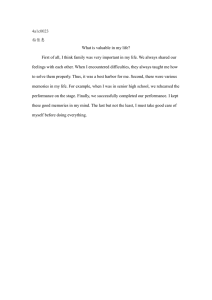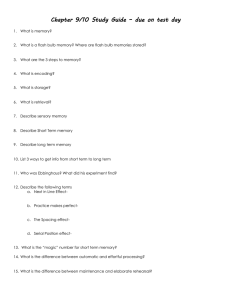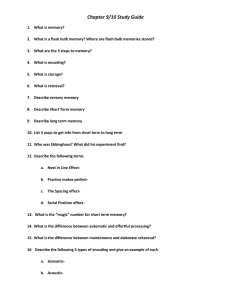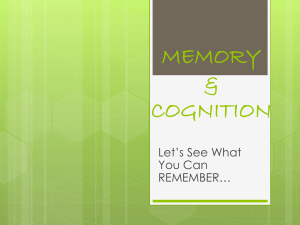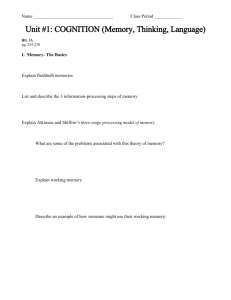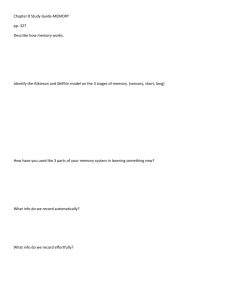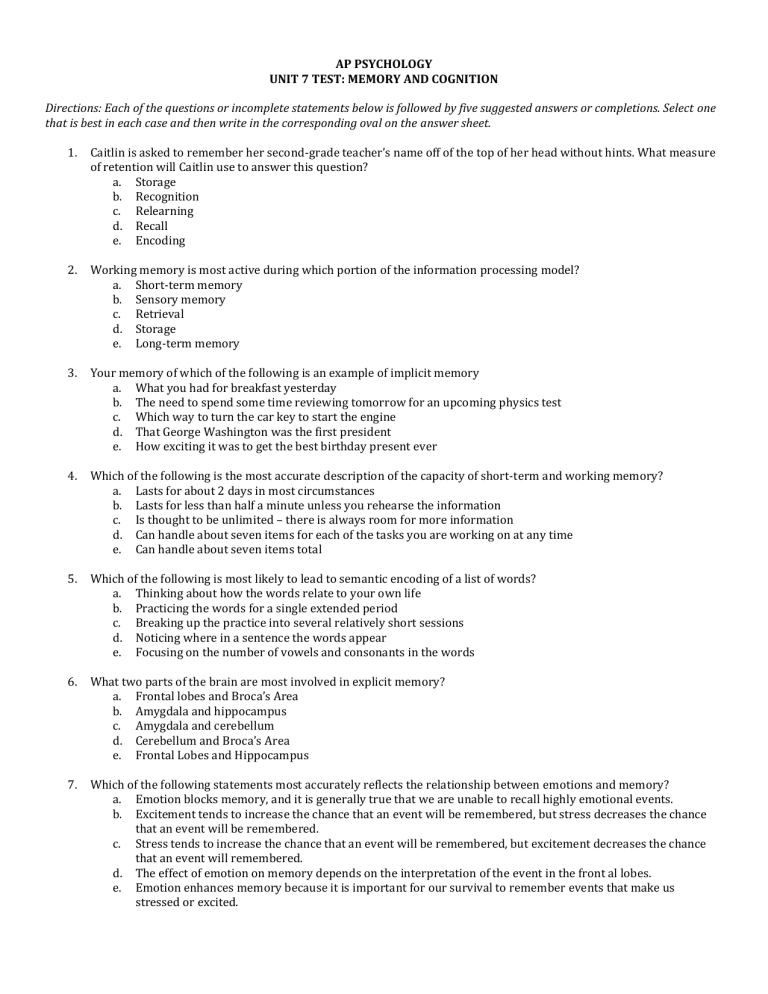
AP PSYCHOLOGY UNIT 7 TEST: MEMORY AND COGNITION Directions: Each of the questions or incomplete statements below is followed by five suggested answers or completions. Select one that is best in each case and then write in the corresponding oval on the answer sheet. 1. Caitlin is asked to remember her second-grade teacher’s name off of the top of her head without hints. What measure of retention will Caitlin use to answer this question? a. Storage b. Recognition c. Relearning d. Recall e. Encoding 2. Working memory is most active during which portion of the information processing model? a. Short-term memory b. Sensory memory c. Retrieval d. Storage e. Long-term memory 3. Your memory of which of the following is an example of implicit memory a. What you had for breakfast yesterday b. The need to spend some time reviewing tomorrow for an upcoming physics test c. Which way to turn the car key to start the engine d. That George Washington was the first president e. How exciting it was to get the best birthday present ever 4. Which of the following is the most accurate description of the capacity of short-term and working memory? a. Lasts for about 2 days in most circumstances b. Lasts for less than half a minute unless you rehearse the information c. Is thought to be unlimited – there is always room for more information d. Can handle about seven items for each of the tasks you are working on at any time e. Can handle about seven items total 5. Which of the following is most likely to lead to semantic encoding of a list of words? a. Thinking about how the words relate to your own life b. Practicing the words for a single extended period c. Breaking up the practice into several relatively short sessions d. Noticing where in a sentence the words appear e. Focusing on the number of vowels and consonants in the words 6. What two parts of the brain are most involved in explicit memory? a. Frontal lobes and Broca’s Area b. Amygdala and hippocampus c. Amygdala and cerebellum d. Cerebellum and Broca’s Area e. Frontal Lobes and Hippocampus 7. Which of the following statements most accurately reflects the relationship between emotions and memory? a. Emotion blocks memory, and it is generally true that we are unable to recall highly emotional events. b. Excitement tends to increase the chance that an event will be remembered, but stress decreases the chance that an event will be remembered. c. Stress tends to increase the chance that an event will be remembered, but excitement decreases the chance that an event will remembered. d. The effect of emotion on memory depends on the interpretation of the event in the front al lobes. e. Emotion enhances memory because it is important for our survival to remember events that make us stressed or excited. 8. Which of the following is an example of a flashbulb memory? a. Barry remembers an especially bright sunrise because he was by the ocean and the sunlight reflected off of the water b. Robert remembers that correlation does not prove a cause-effect relationship because his teacher emphasized the fact over and over again. c. Anna remembers when her father returned from an overseas military deployment because the day was very emotional for her. d. Kris has stronger memories of her second grade teacher than she does of her third grade teacher because her second grade teacher has the same name as her neighbor. e. Anton remembers a moment from his light homecoming dance because a strobe light seemed to freeze the scene in his imagination. 9. Which of the following is an example of the primacy effect? a. Remembering the most important assignment you have to complete for school tomorrow b. Remember the skills you learned early in life, such as walking c. Remembering the last think your English teacher talked about in class yesterday, but nothing from earlier in the class period d. Remembering the names of the first two co-workers you met on the first day of your new job e. Remembering that your clocks must be moved ahead one hour when daylight savings time begins in the spring 10. What psychologist believe that the forgetting of information will occur rapidly at first and will then level off, with the remaining information being retained for a long period of time? a. Herman Ebbinghaus b. Donald Hebb c. Karl Lashley d. Sigmund Freud e. Elizabeth Loftus 11. The text discusses therapist-guided “recovered” memories. Which of the following statements represents an appropriate conclusion. a. Therapists who use hypnosis are likely to help their patients retrieve repressed memories b. Statistics indicate that childhood sexual abuse rarely occurs; therefore, recovered memories of such abuse must be false. c. Memories are only rarely recovered; once you are unable to retrieve a memory you will probably never be able to retrieve it. d. One indicator of whether a recovered memory is true is the patient’s emotional response; only true recovered memories are emotionally upsetting. e. Since the brain is not sufficiently mature to store accurate memories of events before the age of 3, memories from the first 3 years of life are not reliable 12. Which of the following is the best term for mental activities associated with remembering, thinking, and knowing? a. Cognition b. Concepts c. Prototypes d. Convergent thinking e. Divergent thinking 13. Producing valuable and novel ideas best defines which of the following? a. Prototyping b. Cognition c. Intrinsic motivation d. Vernturesome personality e. Creativity 14. What is another term for a methodical, logical rule that guarantees something a particular problem? a. Heuristic b. Algorithm c. Insight d. Mental set e. Confirmation bias 15. Which of the following is the tendency to search for supportive information or preconceptions while ignoring contradictory? a. Confirmation Bias b. Intuition c. Mental set d. Availability heuristic e. Overconfidence 16. When instances come readily to mind, we often presume such events are common. For example, after seeing news reports about people losing their jobs, you might start to believe that you are in danger of being layed-off. You start lying awake in bed each night worrying that you are about to be fired. What of the following is the term for this phenomenon? a. Intuition insight b. Confirmation bias c. Belief perseverance d. Mental set e. Availability heuristic 17. What do we call the smallest distinctive sound units in language? a. Structure b. Morphemes c. Grammar d. Phonemes e. Thoughts 18. Which of the following best identifies the early speech stage in which a child speaks using mostly nouns and verbs a. Two-word stage b. Babbling stage c. One-word stage d. Telegraphic speech e. Grammar 19. The prefix “pre” in “preview” or the suffix “s” in “dogs” are examples of… a. Phonemes b. Morphemes c. Babbling d. Grammar e. Intuition 20. What does the “magical number seven, plus or minus” refer to? a. The ideal number of times to rehearse information in the first encoding session b. The number of seconds information stays in short-term memory with rehearsal c. The capacity of short-term memory d. The number of seconds information stays in echoic storage e. The number of years most long-term memories last 21. Which of the following describes long-term potentiation (LTP)? a. When attempting to retrieve information, it is easier to recognize than to recall. b. Constructed memories have the potential to be either accurate or inaccurate c. Changes in synapses allow for more efficient transfer of information d. Implicit memories are processed by the cerebellum instead of by the hippocampus e. Information is transferred from working memory to long-term memory 22. Which of the following abilities is an example of implicit memory? a. Riding a bicycle while talking to your friend about something that happened in class. b. Retrieving from memory the details of an assignment that is due tomorrow. c. Vividly recalling significant events like the 9/11 attack on New York City and Washington, DC. d. Remembering the details of your last birthday party e. Recognizing names and pictures of your classmates many years after they have graduated 23. When someone provides his phone number to another person, he usually pauses after the area code and again after the next three numbers. This pattern underscores the importance of which memory principle? a. Chunking b. Serial position effect c. Semantic encoding d. Auditory encoding e. Recognition 24. Which of the following is true regarding the role of the amygdala in memory? a. The amygdala helps process implicit memories b. The amygdala supports Freud’s ideas about memory because they allow us to repress memories of trauma c. The amygdala produces long-term potentiation in the brain d. The amygdala help make sure we remember events that trigger strong emotional responses e. The amygdala are active when the retrieval of a long-term memory is primed 25. Which of the following illustrates the serial position effect? a. The only name Kensie remembers from the people she met at the party is Spencer because she thought he was particularly good looking. b. Kimia has trouble remembering information from the book’s first unit when she reviews for the finals c. It’s easy for Brittney to remember that carbon’s atomic number is 6 because her birthday is on December 6 d. Kyle was not able to remember the names of all of his new co-workers after one week on the job, but he could remember them after two weeks. e. Alp is unable to remember the middle of a list of vocabulary words as well as he remembers the first or last words on the list. 26. Which of the following is not an example of a mnemonic device? a. Imagery b. Acronyms c. Rhymes d. Chunking e. Massed rehearsal 27. Which of the following statements concerning memory is true? a. Hypnosis, when used as a component of therapy, usually improves the accuracy of memory b. One aspect of memory that is usually accurate is the source of the remembered information c. Children’s memories of abuse are more accurate than other childhood memories d. Memories we are more certain of are more likely to be accurate e. Memories are often a blend of correct and incorrect information 28. You are more likely to remember psychology information in your psychology classroom than in other environments because of what memory principle? a. Mood congruence b. Context effects c. State-dependency d. Proactive interference e. Retroactive interference 29. Which of the following kinds of information is not likely to be automatically processed? a. Space information b. Time information c. Frequency information d. Complicated information e. Well-learned (rehearsed) information 30. Which of the following is an example of source amnesia? a. Iva can’t remember the details of a horrifying event because she has repressed them b. Mary has entirely forgotten about an incident in grade school until her friend reminds her of the event c. Michael can’t remember this year’s locker combination because he confuses it with last year’s combination d. Stephen misremembers a dream as something that really happened e. Anna, who is trying to lose weight, is unable to remember several of the between-meal snacks she had yesterday. 31. People are more concerned about a medical procedures when told it has a 10 percent death rate than they are when told it was a 90 percent survival rate. Which psychological concept explains this the difference in concern. a. Belief perseverance b. Insight c. Intuition d. Framing e. Confirmation Bias 32. Which of the following illustrates a heuristic? a. Calculating the area of a rectangle by multiplying the length times the width b. Using news reports of corporate fraud to estimate how much business fraud occurs in American business c. Looking in each room of your home to find your sleeping cat d. Following a new recipe to bake a cake for your friend e. Trying every key on your mom’s key ring until you find the key that unlocks the seldom-used storeroom in the basement 33. Which of the following most likely represents a prototype for the concept indicated in parentheses? a. A whale (mammal) b. An ostrich (bird) c. A beanbag chair (chair) d. An igloo (house) e. A golden retriever (dog) 34. The inability to see a problem from a fresh perspective is called what? a. Confirmation bias b. Insight c. Representativeness d. Fixation e. Availability 35. Which concept best explains why people often underestimate the amount of time it will take to complete a project? a. Belief perseverance b. Framing c. Intuition d. The availability heuristic e. Overconfidence 36. Which of the following is not one of Robert Sternberg’s components of creativity? a. A venturesome personality b. Imaginative thinking skills c. A creative environment d. A position of ignorance e. Intrinsic motivation 37. Which of the following demonstrates the representativeness heuristic? a. Deciding that new is dangerous because he wears a large trench coat, dark clothing, and doesn’t talk to many people. b. Fearing air travel because of memories of plane crashes c. Checking in every drawer to find some matches because matches are usually in drawers d. Having the solution to a world problem pop into your head because you have just successfully solved a similar problem e. Applying for jobs in several local grocery stores because your best friend just got a job in a grocery store 38. Benjamin Lee Whorf’s linguistic determinism hypothesis relates to what aspect of the power of language? a. How thinking influences language b. How language influences thinking c. The role of the language acquisition device d. The importance of critical periods in language development e. The development of language in nonhuman animals 39. According to Noam Chomsky, what is the most essential environmental stimulus necessary for language acquisition? a. Exposure to language in early childhood b. Instruction in grammar c. Reinforcement for babbling and other early verbal behaviors d. Imitation and drill e. Positive Reinforcement 40. A moviegoer who cannot identify the name of a film star remembers the name when a friend reviews a list of stars. This incident illustrates which two concepts in human memory a. Rehearsal and chunking b. The primacy effect and recency effect c. Constructive and reconstructive memory d. The sensory register and short-term memory e. Recall and recognition 41. An example of an episodic memory is the memory of a. One’s high school graduation b. The capital of a state c. What the musical note C sounds like d. How to type e. A mood that is triggered by the experience of a particular scent 42. The news of a plane crash causes a couple to cancel their plane reservation and drive 1000 miles in their car instead, even though they know that fatal automobile accidents are much more common than airplane accidents. The couple’s decision mainly involves a. The overconfidence effect b. Confirmation bias c. Belief bias d. The availability heuristic e. The representativeness heuristic 43. Which of the following is not strategy in which we problem solve? a. Heuristics b. Expertise c. Trial and Error d. Insight e. Algorithms 44. What are the rules for combining words into grammatically sensible sentences in a given language? a. Semantics b. Phonetics c. Syntax d. Morphology e. Grammar 45. How many phonemes are in the word lunch? a. 1 b. 2 c. 3 d. 4 e. 5 46. When asked to give an example of what a bird is, Tom replied, “Do you mean a robin?” For Tom, a robin is an example of a(n): a. Algorithm b. Mental Set c. Concept d. Prototype e. Script 47. Which of the following best describes the use of availability heuristics? a. Jack believes that all secretaries are women b. Sam is completing a mathematical problem step by step. c. Andrea fails to turn in an assignment, thinking it is due tomorrow. d. Steve believes that more injuries occur in hockey than in baseball. e. Angelica thinks that bulldogs are the best example of a dog. 48. Which of the following demonstrates the principle of confirmation bias? a. After learning that her friend was depressed, Julie says, “Of course she was depressed. She never wanted to do anything.” b. Joe is passionate about environmental conservation, and refuses to listen to or read any data that contradicts his views. c. Carly hears that the new English teacher loves to read books and attend plays. She then assumes that the teacher is female. d. Erica is trying to solve a physics problem, but cannot think of each equation to use to do so, and instead begins her math homework. e. Samantha wants to eat a can of soup but does not have a can opener, so she uses a knife to cut a hole in the soup can. 49. Rosita was having a hard time remembering the material she learned in class and that she knew was going to be on a test. As she walked into her classroom on the day of the test she immediately started to remember the forgotten content. This sudden occurrence could be explained by a. Recency effect b. Context-dependent or context cues memory c. Primary effect d. Retrieval Failure e. Semantic Association 50. Steve can only remember his old locker combination; he keeps forgetting his new combination. Steve is experiencing a. Blocking interference b. Retroactive interference c. Proactive interference d. Repression interference e. Suppression interference 51. Which of the following are levels of encoding and processing information? a. Visual b. Acoustic c. Semantic d. All of the above e. None of the above 52. Which of the following describes the concept that as infants, we learn new skills which are consolidated and built upon as we age, yet we do not remember learning these skills? a. Babbling b. Telegraphic Speech c. Source Amnesia d. Parallel Processing e. Infantile Amnesia 53. How many morphemes are in the word proactive? a. 0 b. 1 c. 2 d. 3 e. 4 EXTRA CREDIT: WAS THERE SOMETHING THAT YOU STUDIED THAT DID NOT APPEAR ON THE TEST? WRITE A REALISTIC TEST QUESTION AND ANSWER IT CORRECTLY.

